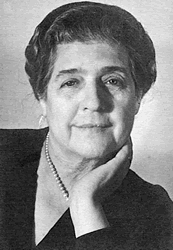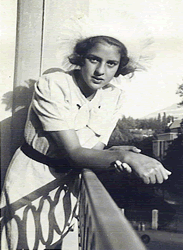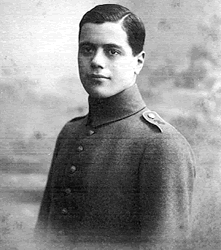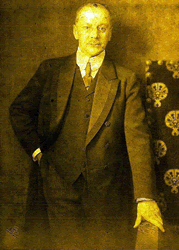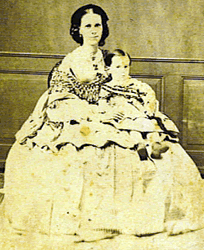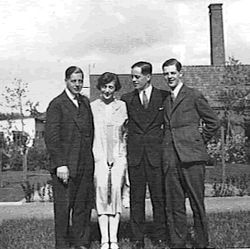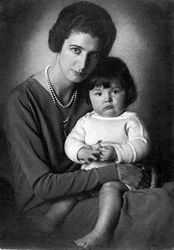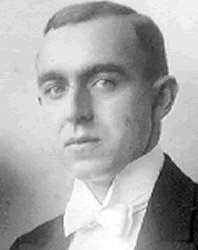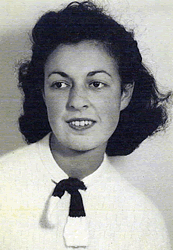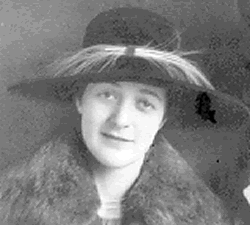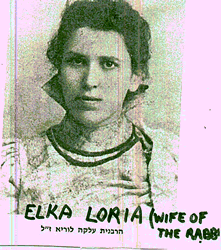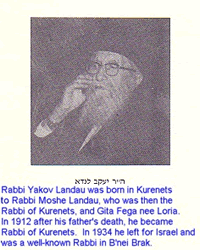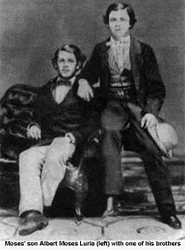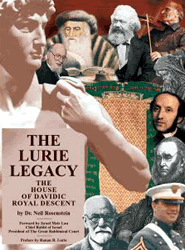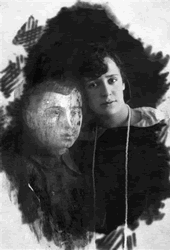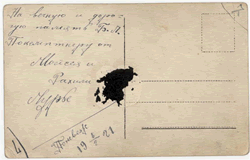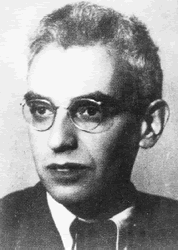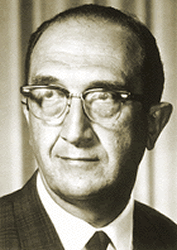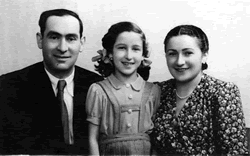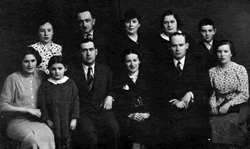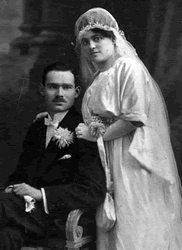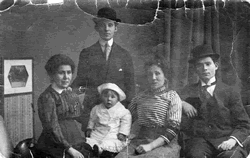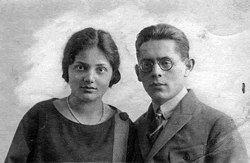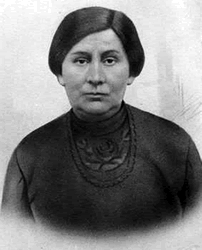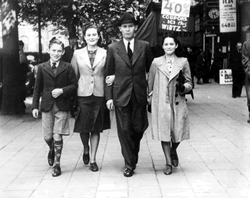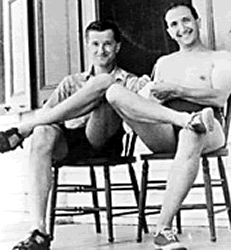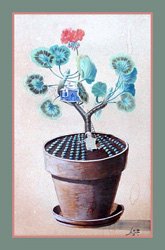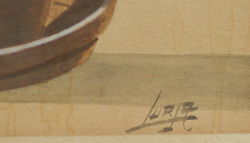#lra-1:
Anita De Sola Luria - wife of Ernst Luria (born 1866 Venezuela - died 1960 New York
#lra-2:
Anita Lederman in 1936 (1921 - 1944 perished in the Shoah) credit; Amos Wulkan, the son of her sister.
#lra-3:
Edgar Luria
#lra-4:
Ernst Luria (1859 St. Thomas- 1913 in Hamburg) pictured in Hamburg about 1910 credit;Amos Wulkan, great grandson.
#lra-5:
Ernst Luria (one year old) with his mother Lea Piza. Picture taken in 1860
#lra-6:
Ernst Luria and Anita De Sola' children from left Frank, Mai, Edgar, Walter From: <amoswu@zahav.net.il >
#lra-7:
Estela de Lima Luria (American wife of Frank Luria) and their son Carlos
#lra-8:
Herbert Lederman (1890 - 1944 perished in the Shoah), husband of Mai nee Luria credit; Amos Wulkan, grandson.
#lra-9:
Margarita Lederman in 1939 (1920 - 1994) credit; Amos Wulkan, her son
#lra-10:
Mai (nee Luria) Lederman (1896 - 1944, perished in the Shoah) credit; Amos Wulkan, grandson
www.lewrockwell.com/orig3/regenstein8.html
#lra-14:
The book is a comprehensive study of the Lurie/Luria family that includes 45 pages of family trees showing the relationship of the Lurie family to such other families as Epstein, Eskeles, Heilprin, Isserles, Katzenellenbogen, Margolit, Meisel, Mendelssohn, Pereira, Weidenfeld and Wulff. The text portion of the book is filled with the history of the Lurie family, critical analysis of previous works about the family and legends by family members penned in the 19th century
#lra-15
#lra-16
Moisey Luria (and his sister*) Rachil Luria (Kirschen*) , Ponevezh Feb 6, 1921
According to my father Dave Kempner, Rachil was a sister-in-law* to Leba Friedman,
father of Chana Peer Slavin, Batia and their brothers
Marlene Dobrin
Batia told me that her mother Asna had an older sister; Sara nee Even Luria ( born c 1870) . She lived with her husband; Eliezer Loria, in Birzai. They had children; Moshe (born c 1900) , Rachel also born in 1900, and Guta. Sara perished in Birzai with her family (see testimony http://www.eilatgordinlevitan.com/birz/birz_pages/birz_stories_batia.html). the people pictured would be the children of the sister in law.
Eilat
#lra-19
http://www.marxists.org/archive/luria/comments/bio.htm
A brief overview of Luria's life and work (by M. Cole)
Alexander Luria was born in Kazan, an old Russian University town east of Moscow. He entered Kazan University at the age of 16 and obtained his degree in 1921 at the age of 19. While still a student, he established the Kazan Psychoanalytic Association, and planned on a career in psychology. His earliest research sought to establish objective methods for assessing Freudian ideas about abnormalities of thought and the effects of fatigue on mental processes.
In 1923 his use of reaction time measures to study thought processes in the context of work settings won him a position at the Institute of Psychology in Moscow where he developed a psychodiagnostic procedure he referred to as the "combined motor method" for diagnosing individual subjects' thought processes. In this method (described in detail in Luria, 1932), subjects are asked to carry out three tasks simultaneously. One hand is to be held steady while the other is used to press a key or squeeze a rubber bulb in response to verbal stimuli presented by the experimenter, to which the subject is asked to respond verbally with the first word to come to mind. Preliminary trials are presented until a steady baseline of coordination is established. At this point, "critical" stimuli which the experimenter believes to be related to specific thoughts in the subject are presented. Evidence for the ability to "read the subject's mind" is the selective disruption of the previously established coordinated system by the critical test stimuli. This method was applied to a variety of naturally occurring and experimentally induced cases, providing a model system for psychodiagnosis that won widespread attention in the west when it was published.The book describing these studies was published in Russian only in 2002, owing to its association with psychoanalytic theorizing which was disapproved of by Soviet authorities.
In 1924 Luria met Lev Semionovich Vygotsky, whose influence was decisive in shaping his future career. Together with Vygotsky and Alexei Nikolaivitch Leontiev, Luria sought to establish an approach to psychology that would enable them to "discover the way natural processes such as physical maturation and sensory mechanisms become intertwined with culturally determined processes to produce the psychological functions of adults" (Luria, 1979, p. 43). Vygotsky and his colleagues referred to this new approach variably as "cultural," "historical," and "instrumental" psychology. These three labels all index the centrality of cultural mediation in the constitution of specifically human psychological processes, and the role of the social environment in structuring the processes by which children appropriate the cultural tools of their society in the process of ontogeny. An especially heavy emphasis was placed on the role of language, the "tool of tools" in this process: the acquisition of language was seen as the pivotal moment when phylogeny and cultural history are merged to form specifically human forms of thought, feeling, and action.
From the late 1920's until his death, Luria sought to elaborate this synthetic, cultural-historical psychology in different content areas of psychology. In the early 1930's he led two expeditions to Central Asia where he investigated changes in perception, problem solving, and memory associated with historical changes in economic activity and schooling. During this same period he carried out studies of identical and fraternal twins raised in a large residential school to reveal the dynamic relations between phylogenetic and cultural-historical factors in the development of language and thought.
In the late 1930's, largely to remove himself from public view owing to the period of purges initiated by Stalin, Luria entered medical school where he specialized in the study of aphasia, retaining his focus on the relation between language and thought in a politically neutral arena. The onset of World War 2 made his specialized knowledge of crucial importance to the Soviet war effort, and the tragic widespread availability of people with various forms of traumatic brain injury provided him with voluminous materials for developing his theories of brain function and methods for the remediation of focal brain lesions. It was during this period that he developed the systematic approach to brain and cognition which has come to be known as the discipline of neuropsychology. Central to his approach was the belief that "to understand the brain foundations for psychological activity, one must be prepared to study both the brain and the system of activity" (1979, p. 173). This insistence on linking brain structure and function to the proximal, culturally organized, environment provides the thread of continuity between the early and later parts of Luria's career.
Following the war Luria sought to continue his work in neuropsychology. His plans were interrupted for several years when he was removed from the Institute of Neurosurgery during a period of particularly virulent anti-semitic repression. During this time he pursued his scientific interests through a series of studies of the development of language and thought in mentally retarded children.
In the late 1950's Luria was permitted to return to the study of neuropsychology, which he pursued until his death of heart failure in 1977. In the years just prior to his death, he returned to earliest dreams of constructing a unified psychology. He published two case studies, one of a man with an exceptional and idiocyncratic memory (Luria, 1968), the other of a man who suffered a traumatic brain injury (Luria, 1972). These two case studies illustrate his blend of classical, experimental approaches with clinical and remediational approach, a synthesis that stands as a model for late 20th Century cognitive science.
#lra-20
http://web.mit.edu/biology/www/biology/named_lectures/luria.shtml
The Biology Department is proud to host the yearly Salvador E. Luria Lecture in the Life Sciences, to honor Dr. Luria, the founder of the MIT Center for Cancer Research.
Dr. Luria became a professor at MIT in 1959. He won the Nobel Prize for Medicine in 1969, for his research in molecular biology, in which he was a pioneer. He also became the world's leading expert in the genetic structure of viruses. He was appointed Institute Professor, one of the highest honors the MIT faculty confers on its own, in 1970.
In 1972 Dr. Luria founded the MIT Center for Cancer Research and was its director for the next thirteen years. Salvador Luria died in Lexington, Massachusetts, on 6th February, 1991.
#lra-21
Shimon and Erna Lorie
with daughter Renee
#lra-22
Erna Lorie, Gusta Loria, Rachel (Rachke) Loria, Sara Teller,
Moniek Teller, Szymon Leibek Loria, Chaim Lorie
#lra-23
Chaim and Anna nee Horowitz Lorje of Krakow 1920.
#lra-24
Chaim Lorje on the right, Reisel LURIE on the left
Date:1912
#lra-25
Chaskel and Betty Loria
#lra-26
Reisel LURIE
Daughter of Ephraim (Efrojm) Landau and Rebeka Rivka Landau
Wife of Moszesz Loria of Krakow
#lra-27
Erna Lorie, Gusta Loria, Rachel (Rachke) Loria, Sara Teller, Teller, Szymon Leibek Loria, Chaim Lorje
#lra-28
#lra-29
#lra-30:
Arthur LOURIE, MA LL.B b. Johannesburg March 10 1903. Son of Harry and
Regina (nee Muller) . In 1977 was deputy director of Dept. of Foreign
Affairs Israel. m. 1 Clara Chase, children Daniel and Barbara; m.2
Jeanette Leibel
Educated : UCT, Cambridge , Harvard. Was Lect. in Law at Wits. 1927-1932.
Political Sec. Jewish Agency London 1933-1948; (under Sokolow and Weizmann )
but was in USA most of WW2; Dir. Amer. Zionist Emergency Council, 1940;
Member, Jewish Agency delegation San Francisco UN conference 1945;
Director, Jewish agency U.N. Office 1946-1948; Israel Consul General NY and
Dep. Perm. Rep UN 1948-1952; raised to rank of Minister 1951; Ass. Dir Gen
Ministry For Affairs Israel 1954-1957;
Ambassador on Special mission to Emperor of Ethiopia 1955; Member Israel
delegation to UN General Assembly 1949-1953; Ambassador to Canada 1957-1959,
Ambassador to Great Britian 1960-1965.
He died in Israel in 1978. There is a group photo with Him, Weizman and
others in SA on http://www.jewishgen.org/SAfrica/gallery/
Norman Lourie was a founder of Habonim in South Africa. Norman Lourie
initiated the founding of Habonim in 1930, ... Moreover, since Norman Lourie
was not only the leader (manhig) of Habonim,
http://www.habonimreunited.com/history/
Among this small audience was an enthusiastic young South African by the
name of Norman Lourie. Norman Lourie was mesmerized by the lecture and
worked with ...
www.habo.org.za/about/history.php
I presume this filmmaker is the same Norman Lourie
j. - Filmmakers captured essence of pre-state, early Israel This equipment
later became the basis of Norman Lourie's company, Palestine Films, the most
productive film unit of the late '40s and early '50s. ...
www.jewishsf.com/content/2-0-/module/displaystory/story_id/13801/edition_id/ 267/format/html/displaystory.html
Archives... films depicting Jewish life around the world, newsreels from
Israel, and works from filmmakers such as Baruch Agadati, Hazel Greenwald,
Norman Lourie, ...
academic.csuohio.edu/kneuendorf/content/archives/fa.htm
As far as I remember, the Lourie in Katz and Lourie Jewellers in Eloff
Street Johannesburg was originally Harry Lourie.
Saul Isroff (London)
I am assisting a friend who of Ashkenazi Jewish background. His mother,
Miriam
Lurie, claims descent from Isaac ben Solomon Luria (1534-1572), a
famous Kabbalist
rabbi, and some kind of kinship with Karl Marx. Royal descent from the
House of
David is claimed for Luria.
Any suggestions or referrals?
--------------------------
One of the more recent scholarly works on the Luries and Davidic Royal
Descent is
"The Lurie Legacy, The House of Davidic Royal Descent" by Dr. Neil
Rosenstein.
This comprehensive tome was published in 2004 and is available from
Avotaynu at
http://www.avotaynu.com/books/lurie.htm
This book has dozens of family trees covering the myriad branches of
the Lurie
family. It also identifies extensive source materials and Davidic
Royal Descent
references.
Dr. Rosenstein is also a frequent contributor to the this JewishGen
discussion
group and, I believe, he is an active member of the JewishGen Rabbinic
SIG.
------------------------------------------------------------
There was a Luria family in Lithuania who claimed descent from Rabbi
Isaac Luria,
who was better known as the "Ari". There were many prominent rabbis in
this family.
However, the late Rabbi Shmuel Gorr told me (and showed me a chart)
that he had
traced this family back to the Maharshal, Rabbi Shlomo Luria, who was a
contemporary of the Ari, and is assumed to have been his relative
although the
exact connection between the two rabbis is unclear.
----------------------
You might start with the Jewish Encyclopedia articles on the Luria
family:
<http://www.jewishencyclopedia.com/view.jsp?artid=627&letter=L>.
Also look at <http://www.jewishgen.org/Rabbinic/journal/descent.htm>.
That article mentions several books that deal with the Luria family.
From: J Luria <justinluria@gmail.com>
Date: Thu, Jan 3, 2019 at 9:33 AM
Subject: Luria-- Dolhinow, Doksicy
To: <egl.comments@gmail.com>
Hello,
I came across your website (http://www.eilatgordinlevitan.com/index.html), and you are doing great work! My name is Justin Luria. I am descended from a family that came from Dolhinow and Doksicy.
Your webpage has many pictures of people and daily life, which reminded me of a book about my family's history. (https://www.worldcat.org/title/here-to-stay-seven-generations-of-a-russian-jewish-family-1823-1988/oclc/866410939). I have a copy, which contains a few families from the area from 1823 onwards (Luria, Shofnis, Rubin, Freedman). If you are interested in scanning/uploading images, I have a copy that I can loan to you. If not, a link to the book may be of interest to any genealogists out there.
Thank you for your hard work,
Justin
http://www.jewishencyclopedia.com/view.jsp?artid=627&letter=L
By : Herman Rosenthal Peter Wiernik Kaufmann Kohler Isaac Broydé Solomon Schechter Bernhard Friedberg
ARTICLE HEADINGS:
Abraham b. Nissan Luria:
David b. Aaron Luria:
Enoch Zundel b. Isaiah Luria:
Isaac ben Solomon Ashkenazi Luria (ARI):
Lives as Hermit.
Disciples.
His Utterances.
The Sefirot.
Return of the Soul.
Influence on Ritual.
Johanan ben Aaron ben Nathanael Luria:
Solomon b. Jehiel Luria:
His Method of Study.
Friendship with Isserles.
A family with wide ramifications and several of whose members were distinguished for mystical tendencies and rabbinical knowledge.
Abraham b. Nissan Luria:
Russian rabbi and grammarian of the first half of the nineteenth century. He was rabbi of Skod (Shad ?) in Lithuania, and is known chiefly through his grammatical work "Nisyonot Abraham" (Wilna, 1821). It consists of two parts, of which the first is on the grammatical passages in Rashi's commentary on the Bible, and the second on similar passages occurring in the older commentaries on the Mishnah and Talmud.
Bibliography: Fürst, Bibl. Jud. ii. 257;
Fuenn, Safah le-Ne'emanim, p. 149, Wilna, 1881.
David b. Aaron Luria:
Russian educator; born in Minsk about 1800; died in Königsberg, Prussia, July, 1873. The son of wealthy parents, he was given a liberal Jewish education, which he later supplemented by the acquisition of a knowledge of the secular sciences. After Lilienthal's failure (1842) to induce the Jews of Minsk to establish a school for Jewish children, Luria took up the work and succeeded beyond all expectations. At first opposed by the Orthodox, he soon overcame all opposition, and in 1843 gained control of the Talmud Torah of Minsk. As its superintendent, he transformed it into a modern institution; and his admirable management won the recognition not only of the local authorities, but even of the central government (see "Journal of the Ministry of Public Education," vol. 53, i. 40).
Luria's success not only turned his former antagonists into warm supporters, but induced the well-to-do Jewish merchants to open a school for their children so that they might be enabled to receive as good an education as was given to the orphans in the Talmud Torah. Thus a merchants' school was founded, also under Luria's management; but it failed on account of circumstances over which he had no control. The support it had received, however, encouraged him to establish the Midrash Ezraḥim or citizens' school, for children of the middle class, which proved a great success, although its fees were more than double those of the local gymnasium. But all his hopes were destroyed when his classes in the Talmud Torah and his Midrash Ezraḥim were closed by order of the government, to make room for the government schools which were then being established in Jewish communities. Greatly disappointed, "his only rewards being a gold medal from the czar and a short poem by Gottlober" ("Ha-Niẓẓanim," p. 214, Wilna, 1850), he retired to his books and his studies, and for the rest of his life took but little interest in public affairs.
Luria was the author of "'Omer ba-Sadeh" (Wilna, 1853), a book for the young, in which Biblical passages are explained in a moral and patriotic sense.
Bibliography: Yevreiskaya Biblioteka, iii. 360 et seq.;
Ha-Shaḥar, iv. 569;
Zeitlin, Bibl. Post-Mendels. pp. 220-221.
Enoch Zundel b. Isaiah Luria:
Russian preacher and author; died in Brest-Litovsk Feb. 13, 1847. He lived for several years in Wilna, and later became successively preacher in New Zhagory and Novogrudok, both in the government ofKovno. He wrote "Kenaf Renanim" on "Pereḳ Shirah" (Krotoschin, 1842; Presburg, 1859; Warsaw, 1888). He wrote also "MoṠot Kenafayim," sermons and addenda to his former work, but it remained in manuscript. A review of the "Kenaf Renanim" is given in "Orient, Lit." 1842, No. 26.
Bibliography: Fuenn, Keneset Yisrael, p. 312;
Feinberg, 'Ir Tehillah, p. 228, Warsaw, 1886.H. R. P. Wi.
Isaac ben Solomon Ashkenazi Luria (ARI):
Lives as Hermit.
Founder of the modern Cabala; born of German parents at Jerusalem in 1534; died at Safed Aug. 5. 1572. While still a child he lost his father, and was brought up by his rich uncle Mordecai Francis, tax-farmer at Cairo, who placed him under the best Jewish teachers. Luria showed himself a diligent student of rabbinical literature; and, under the guidance of Bezaleel Ashkenazi, he, while quite young, became proficient in that branch of Jewish learning. At the age of fifteen he married his cousin, and, being amply provided for, was enabled to continue his studies undisturbed. When about twenty-two years old, becoming engrossed with the study of the Zohar, which had recently been printed for the first time, he adopted the life of a hermit. He removed to the banks of the Nile, and for seven years secluded himself in an isolated cottage, giving himself up entirely to meditation. He visited his family only on the Sabbath, speaking very seldom, and always in Hebrew. Such a mode of life could not fail to produce its effect on a man endowed by nature with a lively imagination. Luria became a visionary. He believed he had frequent interviews with the prophet Elijah, by whom he was initiated into sublime doctrines. He asserted that while asleep his soul ascended to heaven and conversed with the great teachers of the past.
Disciples.
In 1569 Luria removed to Palestine; and after a short sojourn at Jerusalem, where his new cabalistic system seems to have met with but little success, he settled at Safed. There he formed a circle of cabalists to whom he imparted the doctrines by means of which he hoped to establish on a new basis the moral system of the world. To this circle belonged Moses Cordovero, Solomon Alḳabiẓ, Joseph Caro, Moses Alshech, Elijah de Vidas, Joseph Ḥagiz, Elisha Galadoa, and Moses Bassola. They met every Friday, and each confessed to another his sins. Soon Luria had two classes of disciples: (1) novices, to whom he expounded the elementary Cabala, and (2) initiates, who became the depositaries of his secret teachings and his formulas of invocation and conjuration. The most renowned of the initiates was Ḥayyim Vital of Calabria, who, according to his master, possessed a soul which had not been soiled by Adam's sin. In his company Luria visited the sepulchers of Simeon ben Yoḥai and of other eminent teachers, the situation of which had been revealed to him by his constant mentor, the prophet Elijah. Luria's cabalistic circle gradually widened and became a separate congregation, in which his mystic doctrines were supreme, influencing all the religious ceremonies. On Sabbath Luria dressed himself in white and wore a fourfold garment to signify the four letters of the Ineffable Name. His followers looked upon him as a saint who had the power to perform all kinds of miracles, while he himself pretended to be Messiah ben Joseph, the forerunner of Messiah ben David.
His Utterances.
Luria used to deliver his lectures extempore and, with the exception of some cabalistic poems in Aramaic for the Sabbath service, did not write anything. The real exponent of his cabalistic system was Ḥayyim Vital. He collected all the notes of the lectures which Luria's disciples had made; and from these notes were produced numerous works, the most important of which was the " 'Eẓ Ḥayyim," in six volumes (see below). At first this circulated in manuscript copies; and each of Luria's disciples had to pledge himself, under pain of excommunication, not to allow a copy to be made for a foreign country; so that for a time all the manuscripts remained in Palestine. At last, however, one was brought to Europe and was published at Zolkiev in 1772 by Satanow. In this work are expounded both the speculative Cabala, based on the Zohar, and the practical or miraculous Cabala (), of which Luria was the originator.
The Sefirot.
The characteristic feature of Luria's system in the speculative Cabala is his definition of the Sefirot and his theory of the intermediary agents, which he calls "parẓufim" (from Ï€Ï?όσωπν = "face"). Before the creation of the world, he says, the En Sof filled the infinite space. When the Creation was decided upon, in order that His attributes, which belong to other beings as well, should manifest themselves in their perfection, the En Sof retired into His own nature, or, to use the cabalistic term, concentrated Himself (). From this concentration proceeded the infinite light. When in its turn the light concentrated, there appeared in the center an empty space encompassed by ten circles or dynamic vessels ("kelim") called "Sefirot," by means of which the infinite realities, though forming an absolute unity, may appear in their diversity; for the finite has no real existence of itself. However, the infinite light did not wholly desert the center; a thin conduit () of light traversed the circles and penetrated into the center. But while the three outermost circles, being of a purer substance because of their nearness to the En Sof, were able to bear the light, the inner six were unable to do so, and burst. It was, therefore, necessary to remove them from the focus of the light. For this purpose the Sefirot were transformed into "figures" ("parẓufim"). The first Sefirah, Keter, was transformed into the potentially existing three heads of the Macroprosopon ("Erek Anfin"); the second Sefirah, Ḥokmah, into the active masculine principle called "Father" ("Abba"); the third Sefirah, Binah, into the passive, feminine principle called "Mother" ("Imma"); the six broken Sefirot, into the male child ("Ze'er"), which is the product of the masculine active and the feminine passive principles; the tenth Sefirah, Malkut, into the female child ("Bat"). This proceeding was absolutely necessary. Had God in the beginning created these figures instead of the Sefirot, there would have been no evil in theworld, and consequently no reward and punishment; for the source of evil is in the broken Sefirot or vessels, while the light of the En Sof produces only that which is good. These five figures are found in each of the four worlds; namely, in the world of emanation (); in that of creation (); in that of formation ( ); and, in that of action , which represents the material world.
Luria's psychological system, upon which is based his practical Cabala, is closely connected with his metaphysical doctrines. From the five figures, he says, emanated five souls, Neshamah, Ruaḥ, Nefesh, Ḥayyah, and Yeḥidah; the first of these being the highest, and the last the lowest. Man's soul is the connecting link between the infinite and the finite, and as such is of a manifold character. All the souls destined for the human race were created together with the various organs of Adam. As there are superior and inferior organs, so there are superior and inferior souls, according to the organs with which they are respectively coupled. Thus there are souls of the brain, souls of the eye, souls of the hand, etc. Each human soul is a spark ("niẓoẓ") from Adam. The first sin of the first man caused confusion among the various classes of souls: the superior intermingled with the inferior; good with evil; so that even the purest soul received an admixture of evil, or, as Luria calls it, of the element of the "shells" ("ḳelipot"). From the lowest classes of souls proceeded the pagan world, while from the higher emanated the Israelitish world. But, in consequence of the confusion, the former are not wholly deprived of the original good, and the latter are not altogether free from sin. This state of confusion, which gives a continual impulse toward evil, will cease with the arrival of the Messiah, who will establish the moral system of the world upon a new basis. Until that time man's soul, because of its deficiencies, can not return to its source, and has to wander not only through the bodies of men and of animals, but even through inanimate things such as wood, rivers, and stones.
Return of the Soul.
To this doctrine of metempsychosis Luria added the theory of the impregnation ("'ibbur") of souls; that is to say, if a purified soul has neglected some religious duties on earth, it must return to the earthly life, and, attaching itself to the soul of a living man, unite with it in order to make good such neglect. Further, the departed soul of a man freed from sin appears again on earth to support a weak soul which feels unequal to its task. However, this union, which may extend to three souls at one time, can only take place between souls of homogeneous character; that is, between those which are sparks of the same Adamite organ. The dispersion of Israel has for its purpose the salvation of men's souls; and the purified souls of Israelites unite with the souls of men of other races in order to free them from demoniacal influences. According to Luria, man bears on his forehead a mark by which one may learn the nature of his soul: to which degree and class it belongs; the relation existing between it and the superior world; the wanderings it has already accomplished; the means by which it can contribute to the establishment of the new moral system of the world; how it can be freed from demoniacal influences; and to which soul it should be united in order to become purified. This union can be effected by formulas of conjuration.
Influence on Ritual.
Luria introduced his mystic system into religious observances. Every commandment had for him a mystic meaning. The Sabbath with all its ceremonies was looked upon as the embodiment of the Divinity in temporal life; and every ceremony performed on that day was considered to have an influence upon the superior world. Every word, every syllable, of the prescribed prayers contain hidden names of God upon which one should meditate devoutly while reciting. New mystic ceremonies were ordained and codified under the name of "Shulḥan 'Aruk shel Ari." This tendency to substitute a mystic Judaism for the rabbinical Judaism, against which Luria was warned by his teacher of Cabala, David ibn Abi Zimra, became still stronger after Luria's death. His disciples, who applied to him the epithets "Holy" and "Divine," sank further in mysticism and paved the way for the pseudo-Messiah Shabbethai Ẓebi.
The following are the works attributed to Luria by his disciples, given in the order of their publication:
1595. Marpe Nefesh, on the purification of the soul. Venice.
1600. Tiḳḳune ha-Teshubah, on penitence. Published by Elijah Moses de Vidas. Venice.
1615. Seder we-Tiḳḳun Ḳeri'at Shema', mystic explanations of the Shema'. Prague.
1620. Sefer ha-Kawwanot, mystic explanations of the prayers. Venice. (With corrections by Pethahiah ben Joseph, Hanau, 1624; Amsterdam, 1710; Jessnitz, 1723; abridged, under the title "Zot Ḥuḳḳat ha-Torah," by Abraham Ḥazzeḳuni, Venice, 1659.)
1624. Tiḳḳune Shabbat, mystic poems, for Sabbath, and explanations of the Sabbath ceremonies. Venice.
1652. Sefer Ma'yan ha-Ḥokmah, on Creation and on the union between the higher and lower spheres, first published by Abraham Ḳalmanḳes. Amsterdam.
1663. Derek Emet, annotations on the Zohar and the "Sefer ha-Tiḳḳunim." In three parts, Venice, 1663.
1663. Note on the "Zohar he-Ḥadash," with text. Venice.
1680. Shulḥan 'Aruk, mystic explanations of many religious ceremonies. Mubḥar she be-Abot, cabalistic commentary on Pirḳe Abot.
1710. Re'amim u-Re'ashim, prognostications. Constantinople.
1715. Notes on the Zohar, with text. Amsterdam.
1719. Perush Sefer Yeẓirah, commentary on the "Sefer Yeẓirah." Amsterdam.
1728. Tiḳḳun Ashmurot, midnight prayers termed "ḥaẓot." Amsterdam.
1737. Golel Or, on metempsychosis. Published by Meïr ben Ḥalifah Bikayim. Smyrna.
1766. Ḥadrat Melek, commentary on the Zohar. Published by Shalom ben Moses Buzaglio. Amsterdam.
1781. Seder ha-Tefillah, a book of prayer. Published by Aryeh ben Abraham. Zolkiev.
1785. LiḳḳuṠe Shas, cabalistic dissertations on several Talmudic treatises. Korzec.
1785. Zohar ha-Raḳia', commentaries on the Zohar, with the text. Korzec.
1785. Ḳol be-Ramah, on the Idra Rabba, with additions by Jacob ben Ḥayyim Ẓemaḥ. Korzee.
1788. Kelalot Tiḳḳunim we-'Aliyyot ha-'Olamot, on the ascension of the soul. Lemberg.
1839. Ma'or we-Shemesh, cabalistic collectanea. Published by Judah ben Abraham Raphael Koriat. Leghorn.
Ḥayyim Vital, as stated above, produced from the notes of Luria's lectures a work entitled "'Eẓ Ḥayyim" (Korzec, 1784), in six volumes:
(1)
"Oẓerot Ḥayyim," containing twenty-one cabalistic essays;
(2)
"Sefer Derushim," cabalistic explanations of the Bible;
(3)
"Sefer Kawwanot," mystic explanationsof the prayers;
(4)
"Ṭa'ame ha-Miẓwot," on the precepts;
(5)
"Sefer ha-Gilgulim," on metempsychosis;
(6)
"Sefer LiḳḳuṠim," miscellanea.
According to Azulai, Luria wrote in the earlier part of his life novellæ on Zebaḥim and Beẓah. A halakic consultation addressed by Luria to Joseph Caro is inserted in "Abḳat Rokel," (§ 136).
Bibliography: Solomon Shelemiel ben Ḥayyim, Shibḥe ha-Ari, Korzee, 1785;
Orḥot Ẓaddiḳim, Leghorn, 1785;
Naphtali Herz ben Jacob Elhanan, Toledot ha-Ari, published with the 'Emeḳ ha-Melek, Amsterdam, 1648;
Ḥayyim Cohen, Ma'aseh ha-Ari, in the introduction to his Meḳor Ḥayyim, ib. 1655;
Sefer Sedah ha-Ari, ib. 1720;
Ma'aseh Nissim shel ha-Ari, ib. 1720;
Azulai, Shem ha-Gedolim, i. 104;
Conforte, Ḳore ha-Dorot, p. 40b;
Rossi, Dizionario, p. 186;
Steinschneider, Cat. Bodl. col. 1133;
idem, Jewish Literature, p. 456;
D. Ch. Ginsburg, The Kabbalah, p. 134, London, 1865;
Grätz, Gesch. ix. 436 et seq.;
Fuenn, Keneset Yisrael, p. 630.K. I. Br.
Johanan ben Aaron ben Nathanael Luria:
Alsatian Talmudist; lived successively at Niedernheim and Strasburg at the end of the fifteenth century and in the beginning of the sixteenth. After having studied for many years in German yeshibot, he returned to Alsace and settled in Strasburg, where he founded a yeshibah by permission of the government. Luria was the author of an ethical work entitled "Hadrakah" (Cracow, c. 1579) and of "Meshibat Nefesh" (Neubauer, "Cat. Bodl. Hebr. MSS." No. 257), a haggadic and mystical commentary on the Pentateuch, founded on Rashi. To this commentary was appended a dissertation in which Luria refuted the arguments advanced by Christians against Judaism.
Bibliography: Carmoly, Itinéraires de la Terre Sainte, p. 345;
Zunz, Z. G. pp. 106-130;
Orient, Lit. xi. 546;
Steinschneider, Cat. Bodl. col. 1398.K. I. Br.
Solomon b. Jehiel Luria:
Rabbi and author; born in Brest-Litovsk, Lithuania, 1510; died at Lublin Nov. 7, 1573. When still a youth his parents sent him to Posen, where he studied under the guidance of his grandfather Rabbi Isaac Klauberia. He left Posen in 1535, owing to an extensive fire which destroyed his grandfather's property. On his return to his native place he assiduously continued his studies. Here he married Lipka, daughter of Rabbi Kalonymus. After some time he was elected rabbi of Brest, and established a yeshibah there. About 1550 he received the appointment of rabbi and head of the yeshibah at Ostrog, and in 1555 he moved to Lublin, where he became head of the famous yeshibah.
His Method of Study.
Concerning his method of study and teaching he says: "I was painstaking always to trace the last source of the Halakah, which I used to discuss with my friends and pupils, spending sometimes a week in research and close reasoning till I came upon the root of the matter; then I used to put it down in my book. And it was always my habit to quote all the opinions of my predecessors, according to their rank of authority, also the decisions and rulings of those who compiled the responsa, in order to avoid the suspicion of plagiarism or the reproach that I had overlooked the opinion of some great authority. In two years I did not reach in my studies further than half of the tractate Yebamot. I spent a whole year on two chapters of the tractate Ketubot; and the chapter 'Miẓwat Ḥaliẓah' Yebamot] took me half a year." It is therefore not surprising that Luria was very independent, and was not afraid to say in public: "Do not take any notice of what people have been accustomed till now to consider as permitted; for most of them used to read only the 'Ṭur. Oraḥ Ḥayyim' by Rabbi Jacob ben Asher. He gave permission in the name of his father, Rabbi Asher; and in his introduction he even asserts that whenever he quotes the ruling of his father, it should be considered as decisive for practise. And, indeed, many people took it for granted that it is to be looked upon as the last and absolute decision, as though it were handed down to us as a tradition of Moses from Mount Sinai. The fact that he agrees with his father does not pledge us to agree with him; indeed, so it is in many ritual matters that the general usage is against him." Nor does he spare even Joseph Caro, whom he accuses of having occasionally expressed merely superficial views in his effort to harmonize conflicting laws, as well as of having sometimes based his decisions on the reading of corrupt texts.
With even more asperity he speaks of Benjamin Zeeb and his responsa, "Binyamin Ze'eb," which he warns the public are worthless and full of plagiarisms. Of some of the rabbis of his time he says as follows: "The ordained are many; but those who know something are few. The number of overbearing ones is steadily increasing, none of whom knows his place. As soon as they are ordained they begin to domineer and, by means of their wealth, to gather about themselves disciples, just as lords hire slaves to run before them. They rule over the scholars and the congregation. They excommunicate and anathematize, and they ordain pupils who did not study under them, and receive therefor money and reward. They are always seeking their own interests."
Friendship with Isserles.
Though Luria was not on very good terms with most of his contemporaries, yet he formed an intimate friendship with Rabbi Moses Isserles of Cracow, as may be seen from their correspondence. But this friendship did not prevent Luria from remonstrating with Isserles when he learned that the latter was devoted to the study of philosophy, for he exhorted him with the words: "Thou art turning to the wisdom of the uncircumcised Aristotle. Wo unto my eyes that they have seen such a thing! This is a sin for such a prince in Israel." The adherents of the Cabala he censured severely, saying: "These modern ones pretend to belong to the sect of the cabalists. . . . They can not see in the light of the Zohar, which they do not understand. . . . Therefore, do not go in their ways. Have nothing to do with things secret."
Luria's works include: (1) "Ḥokmat Shelomoh" (Cracow, 1582), critical notes on the Talmud and its earlier commentaries; it has been appended to the later editions of the Talmud; (2) Responsa (Lublin, 1574); (3) "Yam shel Shelomoh" (Prague, 1615, and later), novellæ on different treatises of the Talmud: on Baba Ḳamma; on Ḥullin (Cracow, 1646); on Yebamot (Altona, 1740); on Beẓah (Lublin, 1636); on Ḳiddushin (Berlin, 1766); and on GiṠṠin (ib. 1766); (4) "Yeri'ot Shelomoh," supercommentary on the commentary of Elijah Mizraḥi on Rashi, prepared for print by his pupil Jehiel ben Meshullam;(5) "'Ammude Shelomoh" (Basel, 1600), commentary on the book of precepts by Rabbi Moses of Coucy; (6) "'AṠeret Shelomoh"; (7) "Zemirot" (Venice, 1602), commentary on the "Sha'are Dura" of Isaac of Düren (Lublin, 1598), liturgical songs; and others. Many of Luria's works are still extant in manuscript.
Bibliography: Pascheles Israelitischer Volkskalender, x. 49;
Der Orient, ix. 568;
Ha-Maggid, p. 27, Lyck, 1858;
Horodezky, in Ha-Goren, i. 95;
idem, Kerem Shelomoh (1896);
Rabbinowicz, Ma'amar, p. 56, Munich, 1877;
Steinschneider, Cat. Bodl. cols. 23-65;
Nissenbaum, Le-Ḳorot ha-Yehudim be-Lublin, p. 20, Lublin, 1899;
Epstein, Die Familie Lurie, p. 14, Vienna, 1901;
Feinstein, 'Ir Tehillah, p. 198, Warsaw, 1886;
Kohn-Ẓedeḳ, Shem u-She'erit, p. 21, Cracow, 1895;
Güdemann, Quellenschriften zur Gesch. des Unterrichts, p. 59, Berlin, 1891;
Grätz, Gesch. ix. 436;
Ha-Asif (Warsaw), v. 127;
Isr. Letterbode, xi. 165.S . S. B. Fr.
Salvador E. Luria
Max Delbrück and Salvador Luria
The Nobel Prize in Physiology or Medicine 1969
Biography
Salvador Edward Luria was born on August 13th, 1912, in Torino, Italy. He has been a naturalized citizen of the U.S.A. since January 1947.
In 1929 he started his studies in Medicine at the University of Torino, where he obtained his M. D. summa cum laude in 1935. From 1938 to 1940 he was Research Fellow at the Institute of Radium in Paris; 1940-1942, Research Assistant in Surgical Bacteriology at Columbia University; from 1943 to 1950 he was Instructor, Assistant Professor, and Associate Professor of Bacteriology at Indiana University; in 1950 he was appointed Professor of Microbiology at the University of Illinois; from 1959-1964 he has been Professor of Microbiology at the Massachusetts Institute of Technology; in 1964 he became Sedgwick Professor of Biology at the M. I. T. and in 1965, non-resident Fellow at the Salk Institute for Biological Studies. In 1970 Luria was appointed Institute Professor at the Department of Biology of the M.I.T.
Professor Luria was honoured with the following awards: 1935, Lepetit Prize; 1965, Lenghi Prize, Accademia dei Lincei; 1969, Louisa Gross Horwitz Prize, Columbia University.
He was Guggenheim Fellow, 1942-1943 at Vanderbilt and Princeton; during the year 1963-1964 he worked again in Paris, this time at the Institut Pasteur. He is, or has been, Editor or Member of the Editorial Board of the following journals: Journal of Bacteriology, Virology, Experimental Cell Research, Journal of Molecular Biology, Photochemistry and Photobiology, American Naturalist, Proceedings of the National Academy of Sciences, Annual Review of Genetics.
Professor Luria is a Member of the National Academy of Sciences, American Academy of Arts and Sciences, American Philosophical Society, American Academy of Microbiology, American Society for Microbiology (President, 1967-1968), American Society of Biological Chemists, Society for General Microbiology, Genetics Society, American Naturalists, Society for the Study of Development and Growth, A.A.A.S., Sigma Xi, A.A.U.P.
Salvador Edward Luria was, in 1945, married to Zella Hurwitz, they have one son, Daniel, who is studying economics. His wife, Zella Hurwitz Luria, Ph. D., is a Professor of Psychology at Tufts University.
From Nobel Lectures, Physiology or Medicine 1963-1970, Elsevier Publishing Company, Amsterdam, 1972
This autobiography/biography was first published in the book series Les Prix Nobel. It was later edited and republished in Nobel Lectures. To cite this document, always state the source as shown above.
For more updated biographical information, see:
Luria, Salvador Edward, A Slot Machine, a Broken Test Tube: an Autobiography. Harper & Row, New York, 1984.
Luria
Born in 1912 into a distinguished 500-year-old family of Northern Italian Jews, he determined to exercise vigorously the intellectual freedom of his new (1947) American citizenship. After fleeing Fascism in Italy in 1938, he left Paris for the U.S. two years later and applied his genius for molecular biology to the genetics of bacteria. In 1942, while at Vanderbilt University on a Guggenheim fellowship, Luria met and began collaborating with Max Delbruck and Alfred Hershey, the two scientists with whom he would share the 1969 Nobel Prize for Medicine. A convinced socialist, Dr. Luria lost his passport for a time in the 1950s. A decade later he was a vociferous protester against the Viet Nam War and, more recently, has spoken out against American intervention in Central America. "I made up my mind that as a citizen I would be an active participant in American politics, taking advantage of the democratic opportunities that were not available to me in Italy. What scientific achievement I have reached is due to the freedom provided in this wealthy country to all aspects of intellectual enterprise
From: Jon Haydn <jonhaydn@gmail.com>
We have had this wonderful cartoon drawing in our family since the 1950's. It very well may have been purchased (or gifted) in New York City. The signature appears to read Luria but an exhaustive internet search identified another artist.
Any help in identifying this cartoonist will be greatly apreciated :
I want you to be aware that I have published my next book: The Lurie
Legacy. It is a history and genealogy of one of the most distinguished
Jewish
families: the Lurie/Luria family which traces its ancestry back to King
David.
There are nearly 50 pages of family trees showing not only the major
branches of the Lurie family but its links to the Epstein, Eskeles,
Heilprin, Isserles, Katzenellenbogen, Margolit, Meisel, Mendelssohn,
Pereira, Weidenfeld and Wulff families. The text portion of the book is
filled with the history of the Lurie family, critical analysis of
previous works about the family and legends by family members penned in
the 19th century. More than 60 documents of the Lurie family are
illustrated in the book, the earliest dating to the 16th century.
The book is an unusual size 9" x 12". It is printed on glossy paper and
will not only be valuable in your genealogical research but will make a
fine coffee-table book; one every member of your family will enjoy
reading. The cover was designed by the noted artist/political cartoonist
Ranan Lurie.
Additional information, including the complete Table of Contents and
list of illustrations, can be found at
http://www.avotaynu.com/books/lurie.htm.
Sincerely,
Dr. Neil Rosenstein
654 Westfield Avenue
Elizabeth, N.J. 07208
Tel: 908-353-5575
Fax: 908-353-6080
Surname Given Name Father Relationship
LURIA Berko Iser Head of Household died 1837
LURIA Abram Movsha Grandchild 18
LURIA Itsyk Movsha Grandchild 16
LURIA Eydla Berko Daughter 17---- --
LURIA Abram Neukh Head of Household 49 ------------------------------------------LURIA Tema Berko Wife 49
LURIA Zalman Abram Son 24
LURIA Dveyra Leyba Daughter-in-law 24 Zalman's wife
LURIA Doba Zalman Grandchild 2
------- Lida; May-1858
LIURIE Yokhel Movsha Head of Household 32 in 1850 Unknown absence in 1856
LIURIE Leiba Yokhel Son Newborn in 1850 Unknown absence in 1856
Baisogala; May-1858
Siauliai
Kaunas
LURIA Iokhenen David Movsha 24 Missing
Joniskis 21-October-1866
Siauliai
Kaunas
LURIA Girsh Ber Markus Head of Household 22
LURIA Roche Movsha Wife 20
Kursenai May-1858
Siauliai
Kaunas
LURIE Leyb Rafel 49 ------------------------------------------------------------------
LURIE Rivke Abram 30 Leyb's wife
LURIE Ber Leyb's son 26
LURIE Taube 30 Ber's wife
LURIE Rafel Abram Leyb's son 15
LURIE Ginde Berel 12
Seduva May-1858
Siauliai
Kaunas
LURIE Movsha Shmuel's son 27
LURIE Mine Yankel 30 Movsha's wife
LURIE Shlioma Movsha's son 6
LURIE Wolf Liberman Head of Household 36 Craftsman Guild Member
LURIE Girsh Liberman Brother 42 Craftsman Guild Member
LURIE Movsha Wolf Son? 6 Craftsman Guild Member
LURIE Ette Zavulen Brother's Wife 43 Craftsman Guild Member Girsh's wife
LURIE Roche Girsh's daughter Niece to wolf 16
LURIE Shlomo Liberman Brother Unknown place in 1856
LURIE Taube Zorukh Brother's Wife 30 Shliomo's wife
Siauliai 11-October-1866
KaunasLURIE Grune Shakhna 12
Zagare May-1858
Siauliai
Kaunas
LURIE Shlioma Shaia Head of Household 59 in 1850
LURIE Fayvush Zundel 24
LURIE Abram Zundel 23 Fayvush' brother
LURIE Itsyk Meyer 30
LURIE Rivka Ber 22 Abram's wife
LURIE Sheyna Benjamin 22 Itsyk's wife
LURIE Iosel Nosen Kalmen Head of Household 18
LURIE Hatskel Zalmen Head of Household 15 Missing Moved 1876
Zagare (New) 4-April-1866
Siauliai
Kaunas
LURIE Iosif Kalmen Head of Household 31(?) Reregistered as a merchant
Vilnius May-1858
LIURIA Chaim Shmuel Head of Household Died 1854 -------------------------------
LIURIA Shevel Chaim Son 28 Unknown place after 1856
LIURIA Yankel Leyba Chaim Son 24
LIURIA Yankel Iosel Chaim Son 14 in 1854 Unknown place after 1855
LIURIA Golda Chaim Daughter 15
-----------
LURIA Aron Fayvish Head of Household Unknown place after 1856
LURIA Dvora Movsha Wife 60
LURIA Leyba Aron's Son 35
LURIA Chaya Sora Movsha Daughter-in-Law 33 Leyba's wife
LURIA Nekha Leyba's daughter Grandchild 7
LURIA Chava Leah Leyba's daughter Grandchild 5
LURIA Faytel Aron Son 25 missing
LURIA Rivka Mordukh Daughter-in-Law 23 wife of Faytel
LURIA Ester Leah Aron Daughter 31
LURIA Sora Grandchild 3
Anyksciai May-1858
Ukmerge
Kaunas
LIURIE Benjamin Movsha Head of Household 47
LIURIE Rochla Leah Wife 48
LIURIE Leyba Benjamin Son Died 1857
LIURIE Izrail Benjamin Son 16 missing
Seta May-1858
Ukmerge
Kaunas
LIURIY Shaia Kalman Head of Household 42
LIURIY Itka Wife 42
LIURIY Girsha Shaia Son 24
LIURIY Chaya Shaia Daughter 21
LIURIY Rochla Shaia Daughter 14
Leyba Hlavna Cousin 16 in 1853 Unknown 1854 Petit Bourgeois
LIURIY Movsha Izrael Head of Household 44
LIURIY Rivka Wife 46
LIURIY Iudel Nota Movsha Son 23
LIURIY Rocha Daughter-in-law 20 Iudel Nota's wife
LIURIY Liba Itka Movsha Daughter 16
LIURIY Malka Movsha Daughter 10
LIURIY Zelman Izrael Head of Household 34 in 1851 Died 1854
LIURIY Izrael Nota Zelman Son 17
Ukmerge May-1858
Kaunas
LARVE / LARIE Eliash Shlioma Head of Household 58 Unknown 1853
LARVE / LARIE Gitla Estra Wife 58
LARVE / LARIE Shlioma Eliash Son 33
LARVE / LARIE Chaim Eliash Son Died 1853
LARVE / LARIE Gena Daughter-in-law 33 Shlioma's wife
LARIE Shlioma Eliash Head of Household 47
LARIE Basa Wife 42
LARIE Eliash Berko Shlioma Son 23
LARIE Chana Golda Eliash Berko Grandchild 2
LARIE Chaya Shlioma Daughter 8
LARIE Shora Shlioma Daughter 2
1891
Troskunai
Ukmerge
Kaunas
LIURIY Sholom Chaim 57 (24 in 1858 )
LIURIY Rivka Wife 56
LIURIY Mera Yankel Daughter-in-law 28 in 1901
LIURIY Shimel Sholom Chaim Son 22
LIURIY Beyla Shimel Grandchild 4 in 1904
LIURIY Minukha Shimel Grandchild 9 in 1904
LIURIY Abel Movsha Shimel Grandchild 8 in 1904
LIURIY Chaim Sholom Shimel Grandchild 1 in 1904
LIURIY Mendel Sholom Chaim Son 19
LIURIY Chaim Sholom Mendel Grandchild 2 in 1904
LIURIY Leyb Itsyk Sholom Chaim Son 8
LIURIY Rivka Daughter-in-law 31 in 1904
LIURIA Mortkhel Leyba Head of Household 22 in 1907
Veliuona 1874
Kaunas
LYURIA Movsha Tsalko Fayvush Head of Household 51 ---------------------------------
LYURIA Tserna Wife 35
LYURIA Freyde Movsha Tsalko Daughter 15
LYURIA Chaya Movsha Tsalko Daughter 8
LYURIA Chana Movsha Tsalko Daughter 2
LYURIA Girsh Leyb Movsha Tsalko Son 4
LYURIA Zundel Movsha Tsalko Son 1?
Kedainiai
Raseiniai (1818), Kaunas thereafter
Litovsko Vilenskaya (1816), Kaunas thereafter
KRIGER Leyba Iudel 38 14 August 1816 Came from Baisogala in 1816 KRIGER Itte (his wife)
MARBAKH Movsha Kadys 35 Came from Dotnuva in 1814 MARBAKH Rivka his wife
LURIE Kivel Iokhel 24 Came from Kaunas in 1814 LURIE Asne his wife 22
SVOYNIK Leyb Fishel Enkel Head of Household 27 Came from Vilnius in 1815 SVOYNIK Rocha Chana Wife 25
Kedainiai
Raseiniai (1818), Kaunas thereafter
Litovsko Vilenskaya (1816), Kaunas thereafter
LIURIE Abram Iokhel 32
LIURIE Chaya 27
SHVARTS Berel Izrael Head of Household 34
Cekiske December 1868
Kaunas
LYURYA Abram Leyba Yankel Relative 36 -----------------------------------------------
YABLONSKY Leyba David Itsko Head of Household 42
YABLONSKY Tsalel Leyzer Nephew 18
YABLONSKY Leyzer Itsko Brother 54
YABLONSKY Kusel Chaim Itsko Brother 36
PURVE Movsha Ber Itsko Relative 40
PURVE Zelik Vulf Relative 28
Dotnuva
Kaunas
December
1868
LURYA Movsha Iosel Head of Household 50 in 1858
LURYA Iosel Leyba Movsha Son 30
LURYA Geshel Tuvya Movsha Son 13 in 1866
Kedainiai
Kaunas 1874
LURY Iosel Leyba 21 lives in village Maisiagala, Vilnius Uyezd Vilnius Guberniya
Vabalninkas
Panevezys
Kaunas
LURYE Itzek Chaim
Linkuva 1818
Panevezys
Kaunas
LURE Josel Leiba Head of Household Listed with the family of Orel son of Berel BAL
Birzai 1834
Panevezys
Kaunas
LURIE Berel Abram Head of Household
LURIE Eliash Zelik Son Son of Berel son of Abram LURIE
LURIE Sholom Velvel (Valvel) Head of Household
LURIE Sholom Itzek Head of Household
LURIE Shulem Aron Head of Household
LURIE Eliash Sholom Brother-in-law Brother-in-law of Itzko son of Shmuel MILNER
MILNER Itzko Shmuel Head of Household
SHNITZER Michel Josel Listed with family of Itzko son of Shmuel MILNER
Krekenava 1834
Panevezys
Kaunas
LURIE Aizek Berel Head of Household
NURIE / LURIE Movsha Itzek Head of Household
Linkuva1834
Panevezys
Kaunas
LURE Girsh Girsh Head of Household Listed with family of Movsha son of Josel TERTZ
LURIE Josel Leiba Head of Household Listed with family of Leizer son of Yogoshua ZALMINTZE
Panevezys 1834
Kaunas
LURYA Izhaak Nochem Head of Household
Pasvalys 1834
Panevezys
Kaunas
LURIE Movsha Berel Head of Household
LURIE Shaia Movsha Head of Household
LURIE Josel Irmes Girsh Head of Household
LURIE Israel Benjamin Nochem Head of Household
LURIE Noech Berel Head of Household
Pumpenai April- 1834
Panevezys
LURI Aron Beines Michel Head of Household
LURI Wolf Movsha Grona? Head of Household
LURI Leiba Chaim Head of Household
LURI Israel Woolf Head of Household
LURIA Eliash Ovsei Head of Household
LURIA Meyer Leiba Head of Household
LURIA Leiba Chaim Head of Household
LURIE Josel Yankel Head of Household
LURIE Yochel Movsha Head of Household
LURIE Girsh Josel Yochel Head of Household
LURIE Josel Movsha Head of Household
Birzai Volost
Panevezys
Kaunas
January-1898
LURIA Sholom Izrael Head of Household Registered in Birzai, resides in the village of Rinkuskiai since 1870
LURIA Bentsel Sholom Son 35
LURIA Abel Sholom Son 18
LURIA Sora Sholom Daughter 28
Girsudai Volost
Panevezys
Kaunas
January-1898
LURIA Mikhel Iosel Head of Household 55 Registered in Pumpenai, born and resides in the village of Vizory
LURIA Sora Wife 50
LURIA Lipsa Mikhel Daughter 30
LURIA Gita Mikhel Daughter 27
LURIA Riva Mikhel Daughter 22
LURIA Freyda Mikhel Daughter 19
LURIA Solom Mikhel Son 25
LURIA Saya Idel Mikhel Son 17
LURIA Meyer Chaim Mikhel Son 12
Krekenava Volost
Panevezys
Kaunas 1898
LIURIA Chava Rocha Wife 31
LIURIA Uria Iokhel's Son 1
LIURIA Yankel Iokhel's Son 1
Kyburiai Volost very near Vashki
Panevezys
Kaunas 1898
LIURIA Mordkhel son of Movsha Head of Household 26 lives on the manor of Deveytany, Kyburiai Volost since 1877; a peddler
LIURIA Freyda his Wife 26
LIURIA Nera his mother 50
LIURIA Mordkhel his uncle 60
Skrebotiskis Volost
Panevezys
Kaunas 1898
LIURIA Girsha Movsha Head of Household 47 lives in the village of Sitiany, Skrebotiskis Volost since 1871
LIURIA Sora Wife 46
LIURIA Izrael Girsha Son 22
LIURIA Iudel Girsha Son 10
LIURIA Feyga Girsha Daughter 23
LIURIA Senke Girsha Daughter 13
Vilijampole
Kaunas
1898
LURY Leyb Yankel Head of Household 68
LURY Yankel David Leyb Son 28
LURY Girsh Itsik Leyb Son 23
LURY Feyga Wife 60
Babtai
Kaunas
1874
LURIA Abram Itsko Movsha Son 16
LURIA Freyde Movsha Daughter 10
LURIA Movsha Yankel Head of Household 50
LURIA Pesa Wife 46
LURIA Tserna Rive Movsha Daughter13
Cekiske
Kaunas 1874
LURIA Leyb Yankel Head of Household 44
LURIA Feyge Wife 36
LURIA Yankel David Leyb Son 10
LURIA (LURY) Orel Abram Leyb Head of Household 24
LURIA (LURY) Esfir Wife 22
LURIA Abram Leyb Yankel Head of Household 42
LURIA Sora Wife 41
LURIA Benjamin Abram Leyb Son 12
LURIA Chaya Abram Leyb Daughter 17
LURIA Eliash Abram Leyb Son 8
LURIA Mere Abram Leyb Daughter 6
LURIA Mordkhel Abram Leyb Son 4
LURIA Sheyne Abram Leyb Daughter 1
Dotnuva
Kaunas 1874
LYURIA Iosel Leyb Movsha Head of Household 36
LYURIA Seyna Chana Wife 50
LYURIA Gesel Tuvia Iosel Leyb Son 11
LYURIA Mikhel Eliash Movsha Son 8
LYURIA Movsha Iosel Head of Household 64
LYURIA Shloma Bentsel Movsha Son 3
LYURIA Sholem Iosel Movsha Son 10
LYURIA Sora Beyla Movsha Daughter 6
Grinkiskis
Kaunas
1874
LIURIA Yankel Zundel Head of Household 16
LIURIA Zisla Mother 50
LIURIA Movsha Eliash Head of Household 65
LIURIA Basa Wife 50
LIURIA Eliash Movsha Son 19
LIURIA Nokhum Movsha Son15
LIURIA Sora Movsha Daughter 9
LIURIA Abram Eliash Head of Household 51
LIURIA Chave Wife 40
LIURIA Iudel Abram Son 3
LIURIA Leyb Abram Son 26
LIURIA Muse Leyb Grandchild 3
LIURIA Nokhum Yankel Abram Son 7
LIURIA Pese Abram Daughter 8
LIURIA Pese Daughter-in-law 30
Kaunas 1874
LURIYA Lejb Abram Head of Household 53 lives in Vilnius; religious studies LURIYA Khana Wife 52
LURIYA Slova? Lejb Daughter 23
Kedainiai
Kaunas 1874
LYURIA Movsha Leyb Head of Household 26
LYURIA Iosel Leyb Head of Household 20
LYURIA Abram Leyb Head of Household 20
LYURIA Chana Mother 52
LYURIA Chaya Eta Leyb Sister 18
LURIA Movsha Wulf Head of Household 35
LURIA Abram Borukh Movsha Son 4
LURIA Beyla Wife 28
LURIA Gershon Movsha Son 1
LYURIA Leyb Iokhel Head of Household 22
LYURIA Feyga Rocha Wife 22
LYURIA Chaya Slova Leyb Daughter 3 months
LYURIA Taube Dine Leyb Daughter 3
LYURIA Abram Iokhel Son 15
LYURIA Chaya Slova Leyb Grandchild 3 months
LYURIA Feyga Rocha Daughter-in-law 22 Leyb's wife
LYURIA Ginda Head of Household 48
LYURIA Iokhel Borukh Head of Household 48
LYURIA Reyza Wife 44
LYURIA Leyb Iokhel Son 21
LYURIA Movsha Iokhel Son 13
LYURIA Tauba Dina Leyb Grandchild 3
LYURIA Chaim Yankel Iokhel Son 21
LYURIA Rocha Pesa Daughter-in-law 24 Chaim Yankel's wife
LYURIA Chaya Brayna Iokhel Daughter 1
LYURIA Srol Nakhmen Iokhel Son 7
LYURIA Brayna Iokhel Daughter 26
LYURIA Chaya Ginda Iokhel Daughter 28
LYURIA Mera Head of Household 58
LYURIA (LURIA) Fayvus Iokhel Head of Household 26
LYURIA (LURIA) Beyla Wife 25
LYURIA (LURIA) Iokhel? Fayvus Son 1
LYURIA (LURIA) Leah Fayvus Daughter 7
Vabalninkas
Upyte
Vilnius 1834
LURYE Itzek Chaim Head of Household
LURYE (?) Fisel Itzek Head of Ho
Telsiai
Kaunas 1890
LIURIA Abram Mendel Head of Household 47 2nd Guild Merchant
LIURIA Feyga Wife 42
LIURIA Kalman Rakhmiel Abram Son 23
LIURIA David Abram Son 21
LIURIA Ovsey Abram Son 13
LIURIA Mine Abram Daughter 19
LIURIA Mase Abram Daughter 17
Gargzdiai
Telsiai
Kaunas 1897
LIURIA Gite Ester Yankel not related 68 Memelskaya St., in Fayvel Tveria's house, apt. # 3; a peddler
LIURIA Movsha Shaya Iosel Head of Household 40 Memelskaya St., in Ber Bereliovich's house, apt. # 2; a day laborer
LIURIA Elka Shmuel Wife 40 Memelskaya St., in Ber Bereliovich's house, apt. # 2
LIURIA Mine Movsha Shaya Daughter 11 Memelskaya St., in Ber Bereliovich's house, apt. # 2
LIURIA Menukha Movsha Shaya Daughter 9 Memelskaya St., in Ber Bereliovich's . # 2
Raseiniai
Kaunas 1858
LIURIA Todres Shlioma Head of Household 30
LIURIA Leah Mother 58 Shlioma's widow
LIURIA Chaya Daughter-in-law 28 Efroim's wife
LIURIA Abram Movsha Head of Household
LIURIA Efroim Abram Son
LIURIA Izrael Abram Son
LIURIA Riva Wife 57
LIURIA Ginda Abram Daughter 22
LIURIA Mera Abram Daughter 19
Raseiniai
Raseiniai
Kaunas
LIURIA Movsha Shlioma 22 Missing
LURIE Eber Yankel Head of Household 69 2nd Guild Merchant; registered in Kelme Jewish Community1890
Raseiniai District Merchants
KRA/I-106/1/6098LURIE Pesa Taube Wife 51
LURIE Ionel Eber Son 37
LURIE Leah Tserna Daughter-in-law 30
LURIE Girsha Meyer Ionel Grandchild 7
LURIE Sheyma Eber Son 27
LURIE Sheyna Daughter-in-law 24 Wife of Sheyma, son of Eber
LURIE Beyla Eber Daughter 24
Kelme
Raseiniai
Kaunas
LIURIA Shimel Ovsey Head of Household September 1816
LIURIA David Shimel Son 30
LIURIA Girsh Shimel Son 27
LIURIA Shimel Itsyk Shimel Son18
LIURIA Shimel Iones Shimel Son 16
LIURIA Sora Wife 50
LIURIA Gnesa Shimel Daughter 15
LIURIA Sheyna Daughter-in-Law 30 David's wife
LIURIA Gnesa David Grandchild 2
LIURIA Beyla Daughter-in-Law 27 Girsh's wife
LIURIA Freyda Daughter-in-Law 23 Shimel Itsyk's wife
SHUR Hatskel Zavel Son in law 30 Came from Plunge in 1813
SHUR Etka Shimel Daughter 32 Hatskel's wife
Skaudvile
Raseiniai
Kaunas
LIURIE Iudel Lipman Head of Household 45 lives in Skaudvile; a tavern owner 1 September 1847
LIURIE Yankel Iudel Son 9
LIURIE Chaim Iudel Son 4
LIURIE Eliash Iudel Son 2
LIURIE Shaya Iudel Son 19
LIURIE Roche Wife 47
Skaudvile
Raseiniai
Kaunas
LIURIE Iosel Movsha Head of Household 49 lives in Skaudvile; a small proprietor 1-September-1847
LIURIE Yankel Iosel Son 24
LIURIE Movsha Iosel Son 10
LIURIE Roche Wife 47
LIURIE Ente Iosel Daughter 13
LIURIE Ita Iosel Daughter 8
Skaudvile
Raseiniai
Kaunas
LURIA Iudel Movsha Head of Household 35 lives in Silale; a cabman Skaudvile
Raseiniai
Kaunas
LIURIE Shmuylo Movsha Head of Household 37 lives in Skaudvile; a peddler1-September-1847
LIURIE David Shmuylo Son 13
LIURIE Movsha Shmuylo Son 11
LIURIE Gershel Shmuylo Son 10
LIURIE Nakhman Shmuylo Son 4
LIURIE Genta Wife 35
LIURIE Libe Shmuylo Daughter 7
LIURIA Movsha Shlioma Brother
LIURIA Eta Wife 22
LIURIA Tsirla Shlioma Sister 32
LIURIA Bluma Shlioma Sister 22
Skaudvile
Raseiniai
Kaunas
LURIE Chaya Wife 24 1-September-1847
LURIE Rasha Shamshen Zavel Daughter 7
Kelme
Raseiniai
Kaunas
LIURIY Moisei David Son conscripted 1912, lives in Telsiai; registered in Kelme 1912 Raseiniai District Military List (Men Avoiding Conscription)
LIURIY David Movsha Head of Household 60
LIURIY Mera Wife 58
LIURIY Abram Hatskel David Son 40
LIURIY Sheyna David Daughter 24
Skaudvile
Raseiniai
Kaunas
LURIE Shay David Head of Household Skaudvile towndweller; lives in estate Yushkaichiai; farmer and tradesman. 1915
Jews Living in Rural Areas of Raseiniai District
KRA/I-16/1/21
LURIE Iosel Shay Son
LURIE Chana Mera Daughter-in-Law Wife of Iosel
LURIE Yankel Iosel Grandson
LURIE Pesa Leah Iosel Granddaughter
LURIE Brayne Iosel Granddaughter
Kedainiai
Kaunas
Kaunas
LIURIYA Movsha Iokhel Head of Household 53 1843
Military
LIURIYA Iokhel Movsha Son 27
LIURIYA Abram Movsha Son 24
Kedainiai
Kaunas
Kaunas1843
LIURIYA Borukh Iokhel Abram Head of Household 38
1843 Military
Kedainiai
Kaunas
Kaunas1843
LIURIYA Wulf Iokhel Head of Household 43 1843
LIURIYA Leyb Wulf Son 5
Kedainiai
Kaunas
Kaunas
LIURIYA Abram Iokhel Head of Household 50 dead 1839
1843 Military
LIURIYA Iokhel Abram Son 32
LIURIYA Gershon Abram Son 30
LIURIYA Leyb Abram Son 22
Kedainiai
Kaunas
Kaunas
LIURIYA Kivel Iokhel Head of Household 51
1843
Military
LIURIYA Iokhel Kivel Son 22
LIURIYA Leyb Kivel Son19
Kedainiai
Kaunas
Kaunas
LYURIYA Iokhel Abram Head of Household 41 6 females in family; butcher 1852 Craftsmen
LYURIYA Leyb Abram Brother
31
Kedainiai
Kaunas
Kaunas
LYURIYA Iokhel Movsha Head of Household 29
2 females in family; weaver 1852 Craftsmen
LYURIYA Abram Movsha Brother 25
LYURIYA Iosel Movsha Brother 18
Kedainiai
Kaunas
Kaunas
LIURIA Leyb Abram Head of Household 46 1863
Military
LIURIA Movsha Leyb Son 10
LIURIA Iosel Leyb Son 4
Kedainiai
Kaunas
Kaunas
LIURIA Iokhel Movsha Head of Household 40 1863 Military
Kedainiai
Kaunas
Kaunas
LIURIA Movsha Wulf Head of Household 24 1863
Military
Kedainiai
Kaunas
Kaunas
LYURYA Iokhel Borukh Head of Household 42 December, 1868
Military
LYURYA Chaim Yankel Iokhel Son 15 in 1866
LYURYA Borukh Abram 58
Kedainiai
Kaunas
Kaunas
LYURYA Iokhel Movsha Head of Household 35 in 1858
died 1862 December
1868
Military
LYURYA Fayvish Iosel Iokhel Son 21
LYURYA Leyba Iokhel Son 15 in 1866
Kedainiai
Kaunas
Kaunas
LYURYA Movsha Vulf Head of Household 29 December,1868
Military
Kedainiai
Kaunas
Kaunas
LYURYA Leyba Abram Kivel Head of Household 50
December
1868
Military
LYURYA Abram Leyba Abram Son 15 in 1866
Krakes
Kaunas
Kaunas
LIURIA Eliash Leyba Head of Household 55 resides in Zemaiciu
Naumiestis; a Rabbi 1-July-1847
51
Lygumai
Siauliai
Kaunas
LYURIE Girsha Ber Mortkhel Fishel Head of Household
30 in 1874 from Joniskis
1885
38865 in 1834
LYURIE Gilel Girsha Ber Son 12 in 1874 recruited,
from Joniskis
LYURIE Azriel Girsha Ber Son 10 in 1874 from Joniskis
LYURIE Eshie Girsha Ber Son 2 in 1874 from Joniskis
LYURIE Reyze Wife 30 in 1874 from Joniskis
LYURIE Khone Girsha Ber Daughter 8 in 1884 died,
Joniskis
LYURIE Shie Girsha Ber Daughter 6 in 1884 died,
Joniskis
LYURIE Leyzer Girsha Ber Son 2 in 1884 died, Joniskis
Lygumai
Siauliai
Kaunas
LYURIE Abram Leyba Girsha Ber Son 10 in 1874 from
Joniskis 1885391232 in 1834
LYURIE Mendel Pinkhus Girsha Ber Son 6 in 1874 from
Joniskis
LYURIE Abel Girsha Ber Son 1 month in 1874
from Joniskis
LYURIE Ite Wife 30 in 1874 from Joniskis
LYURIE Rokhelya Girsha Ber Daughter 13 in 1874 from
Joniskis
LYURIE Tirtse Girsha Ber Daughter 7 in 1874 from
Joniskis
LYURIE Khone Girsha Ber Daughter 3 in 1874 from
Joniskis
VilniusLURIA Yankel Itsko Head of Household 29 15-May-1858
LURIA Meyer Itsko Brother missing
LURIA Feyga Mordukh Leyzer Wife 25
LURIA Etka Rochla Yankel Daughter 5
LURIA Gdalka (?) Yankel Daughter 3
LURIA Sheyna Meyer Mother 50
Vilnius
LURIA Gershon Iser Head of Household 60
LURIA Chaim Gershon Son 23 Moved 1861 moved to Minsk Vilnius
LURIA Itsko Borukh Eliash Head of Household 42
15
May
1858
LURIA Roda Movsha Wife 39 Vilnius
LURIA Yankel Benjamin Head of Household 71
15
May
1858
LURIA Meriam Movsha Wife 52 Surname Given Name Comments Town
Source Year
LURIA Aharon brother of Eliezer
Birzai, Lith. Hamelitz #122 1900
LURIA Eliezer
Birzai, Lith. Hamelitz #137 1900
LURIA Eliezer
Birzai, Lith. Hamelitz #137 1900
LURIA Eliezer brother of Aharon
Birzai, Lith. Hamelitz #122 1900
LURIA Tzvi
Birzai, Lith. Hamelitz # 198 1893
LURIA Tzvi
Birzai, Lith. Hamelitz #137 1900
LURIA Tzvi
Birzai, Lith. Hamelitz #122 1900
LURIA Tzvi
Birzai, Lith. Hamelitz #137 1900
LURIA Yisroel
Birzai, Lith. Hamelitz #137 1900
LURIA Yisroel
Birzai, Lith. Hamelitz #122 1900
LURIA Yisroel
Birzai, Lith. Hamelitz #137 1900
LURIA Aharon for Keren Kayemet Daugavpils, Lat. Hamelitz #23 1901
LURIA Artur
Daugavpils, Lat. Hamelitz #123 1897
LURIA Chaim Beis Hakneses Hagadol Daugavpils, Lat. Hamelitz #2 1896
LURIA Chaim
Daugavpils, Lat. Hamelitz #121 1897
LURIA Chaim
Daugavpils, Lat. Hamelitz #150 1897
LURIA Gershon
Daugavpils, Lat. Hamelitz #121 1897
LURIA Gershon
Daugavpils, Lat. Hamelitz #150 1897
LURIA Leib ben Chaim
Daugavpils, Lat. Hamelitz #150 1897
LURIA Moshe
Daugavpils, Lat. Hamelitz #215 1893
LURIA Y A
Gargzdiai, Lith. Hamelitz #120 1903
LURIA Yitzchok Leib
Gargzdiai, Lith. Hamelitz #120 1903
LURIA Ari Leib
Hanoshishok, Lith. Hamelitz #288 1897
LURIA Aharon Kloiz Nawiezer Kaunas, Lith. Hamelitz #176 1900
LURIA Shuval (female) Kloiz R. Tz. Newiazski Kaunas, Lith. Hamelitz #
238 1902
LURIA Ch Sh Rabbi Keidainiai, Lith. Hamelitz # 251 1903
LURIA Chaim Shalom
Keidainiai, Lith. Hamelitz #216 1899
LURIA Shlomo Shraga
Keidainiai, Lith. Hamelitz #137 1900
LURIA Shlomo Shraga
Keidainiai, Lith. Hamelitz #137 1900
LURIA Shraga
Keidainiai, Lith. Hamelitz #216 1899
LURIA Moshe husband of Zelde Wilkowski wed 10 Elul Kupiskis, Lith. Hamelitz
#195 1900
LURIA Mordechai
Kursenai, Lith. Hamelitz #237 1897
LURIA Devorah
Panevys, Lith. Hamelitz #132 1900
LURIA RM
Panevys, Lith. Hamelitz #132 1900
LURIA Zelig
Panevys, Lith. Hamelitz #224 1895
LURIA D
Rezekne, Lat. Hamelitz #185 1897
LURIA R Y Green Beis Hamidrash Rezekne, Lat. Hamelitz #201 1897
LURIA Amalia wife of Meir wed 7 Adar Riga, Lat. Hamelitz #60 1895
LURIA E
Riga, Lat. Hamelitz #43 1894
LURIA
doctor Riga, Lat. Hamelitz #214 1900
LURIA Mordechai
Salatai, Lith. Hamelitz #140 1900
LURIA Nachman
Salatai, Lith. Hamelitz #140 1900
LURIA Sulam
Salatai, Lith. Hamelitz #140 1900
LURIA Shmuel
Seduva, Lith. Hamelitz #10 1897
LURIA Shaul
Siauliai, Lith. Hamelitz #189 1895
LURIA Sheima Rabbi - Beis Hamidrash Hagodol Siauliai, Lith. Hamelitz #230
1902
LURIA Shleima rabbi gaon Siauliai, Lith. Hamelitz #189 1895
LURIA Yona
Siauliai, Lith. Hamelitz #189 1895
LURIA Yona
Siauliai, Lith. Hamelitz #69 1897
LURIE Shaul for hungry in Bessarabia Siauliai, Lith. Hamelitz #87 1901
LURIE Sheime for hungry in Bessarabia Siauliai, Lith. Hamelitz #87 1901
LURIA Liberman
Taurage, Lith. Hamelitz #140 1900
ZI-LER Menachem
Taurage, Lith. Hamelitz #201 1900
LURIA Roze mother of Sheine Fradil
Ukmerge, Lith. Hamelitz #156 1895
LURIA Sheine Fradil bas Roze
Ukmerge, Lith. Hamelitz #156 1895
LURIA Shmuel Zev
Ukmerge, Lith. Hamelitz #156 1895
LURIA Zev
Ukmerge, Lith. Hamelitz #221 1893
LURIA Zev
Ukmerge, Lith. Hamelitz #230 1895
LURIA Dovid
Varniai, Lith. Hamelitz #132 1898
LURIA Nachum
Varniai, Lith. Hamelitz #132 1898
LURIA Nachum
Varniai, Lith. Hamelitz #108 1900
LURIA Nochum
Varniai, Lith. Hamelitz #23 1901
LURIA Yakov
Varniai, Lith. Hamelitz #108 1900
LURIA Elchanan
Ventspils, Lat. Hamelitz #151 1898
LURIA Beile Mrs. Vilnius, Lith. Hamelitz #129 1898
LURIA Yakov Yosef Kloiz R. Yisroel Zaretzer Vilnius, Lith. Hamelitz #
192 1900
LURIA Pesach Halevi
Vistytis, Lith. Hamelitz #85 1899
LURIA Yehuda
Vistytis, Lith. Hamelitz #99 1898
LURIA Yitzchok
Vistytis, Lith. Hamelitz #99 1898
LURIA Yitzchok for the hungry in Bessarabia Vistytis, Lith. Hamelitz #87
1901
LURIA Leib
Zagare Chadash, Lith. Hamelitz #124 1900
LURIA Leib
Zagare Chadash, Lith. Hamelitz #124 1900
LURIA Tzvi Arieh ben Rabbi Moshe Betzalel mechutan of Mordechai Shal Chatzes
Zagare Chadash, Lith. Hamelitz # 192 1893
LURIA Leib
Zagare, Lith. Hamelitz #167 1898
LURIA Tz A
Zagare, Lith. Hamelitz #250 1894
LURIA Tzvi Ari
Zagare, Lith. Hamelitz # 228 1898
LURIA Freida wife of Ephraim Nechamiah Berkson wed 11 Adar Zasliai, Lith.
Hamelitz #67 1899
LURIA Binyomin Kloiz Hatchalas Shasee Kaunas, Lith. Hamelitz #238 1902
LURIA Alkana Yeshei
Pasvalys, Lith. Hamelitz #234 1902
LURIA Shlomo on occasion of Kremer-Fram wedding Skaudvile, Lith. Hamelitz
#232 1902
LURIA Bertha guest at Tiles-Epshtein engagement Vilnius, Lith. Hamelitz
#6 1899
LURIA Bila - widow collected to mark Bris of Dovid Olita Vilnius, Lith.
Hamelitz #181 1893
LURIA L
Vilnius, Lith. Hamelitz #4 1894
LURIA Sh Bris of Dov Gintzburg 8 Sivan Vilnius, Lith. Hamelitz #150 1895
LURIA Shmarya husband of Chanah Pewzer wed Vilnius, Lith. Hamelitz #227
1894
LURIA Simcha Kloiz Potashkin, on Pesach, for the hungry in Bessarabia
Vilnius, Lith. Hamelitz #135 1900
LURIA Yitzchok Kloiz Potashkin, on Pesach, for the hungry in Bessarabia
Vilnius, Lith. Hamelitz #135 1900
LURIA Yosef husband of Chanah Katznelsohn from Bobruisk Doctor, wed Vilnius,
Lith. Hamelitz #185 1897
LURIA Pesach widower Vistytis, Lith. Hamelitz #232 1902
Sex FatherGrandfather MotherGrandfatherMaiden Surname Comments DayMonthYear
TownUyezdGuberniya Record / PublicationRecord #
LURIYA, David Bey M Perets Smul Pesse
Father miller from Podvolsk 7 March 1877 Birzai Panevezys Kaunas
Vital Records / Births 19
LURJE, Jankel Ber
Transcribed from videotaped narration. Unverified. 1897
Pasvalys Panevezys Kaunas Transcribed videotape narration /
Vital Records / Births
LURJE, Smuel Transcribed
from videotaped narration. Unverified. 1897 Pasvalys Panevezys Kaunas
Transcribed videotape narration / Vital Records / Births
LURJE, Lurje Zundel Leib
Transcribed from videotaped narration. Unverified. 1901
Pasvalys Panevezys Kaunas Transcribed videotape narration /
Vital Records / Births
LURJE, Juca Transcribed
from videotaped narration. Unverified. 1908 Pasvalys Panevezys Kaunas
Transcribed videotape narration / Vital Records / Births
NameMaiden Name FatherMother RelationshipSpouse Age / Year of Birth TownPlace
of Execution Comments DateYahrzeit Date TownUyezdGuberniya Source
LURIE, Abram Skaudvile Puzai
Forest 21 July 1941 Tammuz 26, 5701
Skaudvile Raseiniai Kaunas Soviet Extroardinary Commission
Report
LURIE, Alter Skaudvile Puzai
Forest 21 July 1941 Tammuz 26, 5701
Skaudvile Raseiniai Kaunas Soviet Extroardinary Commission
Report
LURIE, Bencil Skaudvile Puzai
Forest 21 July 1941 Tammuz 26, 5701
Skaudvile Raseiniai Kaunas Soviet Extroardinary Commission
Report
LURIE, Braine Skaudvile Batakiai
19 September 1941 Elul 29, 5701 Skaudvile Raseiniai Kaunas
Soviet Extroardinary Commission Report
LURIE, Chana Skaudvile Batakiai
19 September 1941 Elul 29, 5701 Skaudvile Raseiniai Kaunas
Soviet Extroardinary Commission Report
LURIE, Chaya Skaudvile Batakiai
19 September 1941 Elul 29, 5701 Skaudvile Raseiniai Kaunas
Soviet Extroardinary Commission Report
LURIE, Dovid Skaudvile Puzai
Forest 21 July 1941 Tammuz 26, 5701
Skaudvile Raseiniai Kaunas Soviet Extroardinary Commission
Report
LURIE, Feivel Skaudvile Batakiai
19 September 1941 Elul 29, 5701 Skaudvile Raseiniai Kaunas
Soviet Extroardinary Commission Report
LURIE, Frade Skaudvile Batakiai
19 September 1941 Elul 29, 5701 Skaudvile Raseiniai Kaunas
Soviet Extroardinary Commission Report
LURIE, Israel Skaudvile Puzai
Forest 21 July 1941 Tammuz 26, 5701
Skaudvile Raseiniai Kaunas Soviet Extroardinary Commission
Report
NameMaiden Name FatherMother RelationshipSpouse Age / Year of Birth TownPlace
of Execution Comments DateYahrzeit Date TownUyezdGuberniya Source
LURIE, Itzik Skaudvile Puzai
Forest 21 July 1941 Tammuz 26, 5701
Skaudvile Raseiniai Kaunas Soviet Extroardinary Commission
Report
LURIE, Kbel Skaudvile Puzai
Forest 21 July 1941 Tammuz 26, 5701
Skaudvile Raseiniai Kaunas Soviet Extroardinary Commission
Report
LURIE, Nachman Skaudvile Puzai
Forest 21 July 1941 Tammuz 26, 5701
Skaudvile Raseiniai Kaunas Soviet Extroardinary Commission
Report
LURIE, Nachum Skaudvile Batakiai
19 September 1941 Elul 29, 5701 Skaudvile Raseiniai Kaunas
Soviet Extroardinary Commission Report
LURIE, - Skaudvile Puzai
Forest 21 July 1941 Tammuz 26, 5701
Skaudvile Raseiniai Kaunas Soviet Extroardinary Commission
Report
LURIE, - Skaudvile Batakiai
19 September 1941 Elul 29, 5701 Skaudvile Raseiniai Kaunas
Soviet Extroardinary Commission Report
LURIE, - Skaudvile Batakiai
19 September 1941 Elul 29, 5701 Skaudvile Raseiniai Kaunas
Soviet Extroardinary Commission Report
LURIE, - Skaudvile Batakiai
19 September 1941 Elul 29, 5701 Skaudvile Raseiniai Kaunas
Soviet Extroardinary Commission Report
LURIE, Sora Skaudvile Batakiai
19 September 1941 Elul 29, 5701 Skaudvile Raseiniai Kaunas
Soviet Extroardinary Commission Report
LURIE, - Skaudvile Batakiai
19 September 1941 Elul 29, 5701 Skaudvile Raseiniai Kaunas
Soviet Extroardinary Commission Report
NameMaiden Name FatherMother RelationshipSpouse Age / Year of Birth TownPlace
of Execution Comments DateYahrzeit Date TownUyezdGuberniya Source
LURIE, Yankel Skaudvile Puzai
Forest 21 July 1941 Tammuz 26, 5701
Skaudvile Raseiniai Kaunas Soviet Extroardinary Commission
Report Age / Year Born FatherMother Business / Profession AddressTelephone
TownUyezdGuberniya Record / PublicationYear Serial #Page #ID #
LEVIN / LURIE, Fradke Found in Lithuania
Birzai Panevezys Kaunas Lithuanian Holocaust
Survivers Lists 1946
LIURE, Berko (unknown) heir
Grodnenskaya Street Kalvarija Kalvarija Suwalki
Street Directory - Home Owners 1908
LIURIE, Eiga Enta Yurborskaya
Street 66d Pilviskiai Vilkaviskis Suwalki
Street Directory - Home Owners 1908
LIURIE, Gertzko Yurkshanskaya
Street Pilviskiai Vilkaviskis Suwalki Street
Directory - Home Owners 1908
LIURIE, Iser Yurborskaya Street
64b Pilviskiai Vilkaviskis Suwalki Street
Directory - Home Owners 1908
LIURIE, Leiba country / out-ot-town
Pilviskiai Vilkaviskis Suwalki Street Directory - Home
Owners 1908
LIURIE, Liba country / out-ot-town
Pilviskiai Vilkaviskis Suwalki Street Directory - Home
Owners 1908
LIURIE, Movsha country / out-ot-town
Pilviskiai Vilkaviskis Suwalki Street Directory - Home
Owners 1908
LIURIE, Rafal country / out-ot-town
Pilviskiai Vilkaviskis Suwalki Street Directory - Home
Owners 1908
LIURIE, Zelig Yurborskaya Street
151 Pilviskiai Vilkaviskis Suwalki Street
Directory - Home Owners 1908
NameAge / Year Born FatherMother Business / Profession AddressTelephone
TownUyezdGuberniya Record / PublicationYear Serial #Page #ID #
LOURIE, Cecile (Child) Found in France
Kaunas Kaunas Kaunas Lithuanian Holocaust
Survivers Lists 1946
LOURIE, Liliane Found in France
Kaunas Kaunas Kaunas Lithuanian Holocaust
Survivers Lists 1946
LOURIE, Rachel Found in France
Kaunas Kaunas Kaunas Lithuanian Holocaust
Survivers Lists 1946
LURIA, Avraham Meir
Kaunas Kaunas Kaunas Orah le-Hayim (Prenumeranten List) 1878
LURIA, Yehuda Leib b. Aqiva
Kaunas Kaunas Kaunas Emek Halakha (Prenumeranten
List) 1845
LURIA, Yehuda Leib Yitzhak Isaac
Vilijampole Kaunas Kaunas Orah le-Hayim (Prenumeranten
List) 1878
LURIA, Moshe Mishl Av beth din (Chief
justice of the Jewish court) Haskama Father of the author
Krekenava Panevezys Kaunas Ateret Sha
